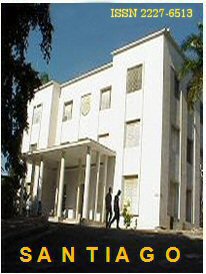Considerations on the factors that limit the management of energy efficiency in the organizations of Santiago de Cuba
Keywords:
Energy efficiency, energy management, energy resourcesAbstract
The work aims to argue from the factors; Political, economic and cultural importance of promoting the efficient use of energy resources in the organization, in order to promote the development of a culture in favor of the efficient use of these resources. Also it is evidence that these factors are interrelated and the existence of contradictions for the management of the efficient use of energy resources in organizations. Taking into account all of the above, it is proposed, as a way to solve the contradictions identified, the design of a model that allows efficient management of the use of energy resources in the organization.
References
Álvarez Espinosa, A. C., et al. (2015). Compromiso de Reducción de Emisiones de Gases de Efecto Invernadero. Recuperado de https://colaboracion.dnp.gov.co
Arlandis, F. (2004). Reflexiones sobre el cumplimiento del protocolo de Kioto. Revista Valenciana de economía y hacienda, 10, 9-28.
Castro F. (2007). Diálogo de civilizaciones. Oficina de publicaciones del Consejo de Estado de la República de Cuba.
Cagno, E., Worrell, E., Trianni, A., Pugliese, G. (2013). A novel approach for barriers to industrial energy efficiency. Renewable and Sustainable Energy Reviews, 19, 290–308.
Carpio, C., y Coviello, M. (2013). Eficiencia energética en América Latina y el Caribe: avances y desafíos del último quinquenio. Recuperado de http://repositorio.cepal.org/handle/11362/4106
Javied, T., Rackow, T., y Franke, J. (2015). Implementing energy management system to increase energy efficiency in manufacturing companies. Procedia CIRP, 26, 156-161. Recuperado de http://www.sciencedirect.com/science/article/pii/S2212827114008701
Le, M. (2013). La dependencia del petróleo: ¿obstáculo o estímulo para un cambio de matriz energética? Letras Verdes. Revista Latinoamericana de Estudios Socioambientales, 8, 4-6. Recuperado de http://revistas.flacsoandes.edu.ec
Ramírez, S. M., Palau, I. G., y Jiménez, A. N. (2006). La gestión energética. Una herramienta indispensable en la gestión empresarial. Folletos Gerenciales, 10(6). Recuperado de http://go.galegroup.com/ps/i.do?id=GALE%7CA174970481
Vilches, A. y Gil, D. (2012). Año Internacional de la Energía Sostenible para Todos: La transición desde las energías no renovables a la energía sostenible. Revista Española de Física, 26(4). Recuperado de http://revistadefisica.es/index.php/ref/article/view/1806
Zanoni, J. R. (2006). ¿Qué pueden hacer las políticas energéticas por la integración? Nueva Sociedad, 204, 176-185. Recuperado de http://search.proquest.com/openview/770f2a205da5d9d6bc8dca69e4859f64/1?
Downloads
Published
Issue
Section
License
Copyright (c) 2017 Mónica Rosario Berenguer-Ungaro, Norma Rafaela Hernández-Rodríguez, Maria de los Angeles Reina-González, José Armado Estrada-Hernández

This work is licensed under a Creative Commons Attribution-NonCommercial-NoDerivatives 4.0 International License.
CC Reconocimiento-NoComercial-SinObrasDerivadas 4.0


.jpg)

_de_logo.jpg)












